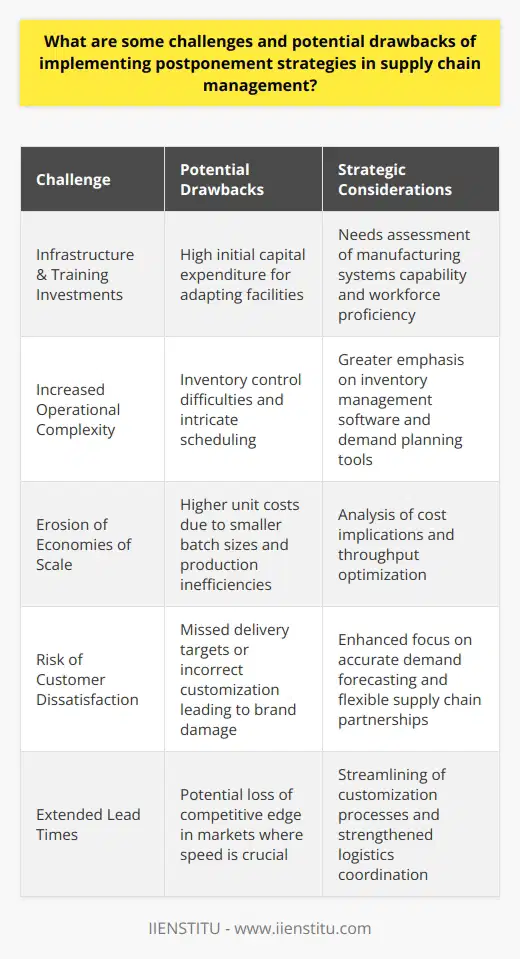
This article discusses the concept of order postponement in the logistics supply chain, the reasons why it is necessary, and its implications for the logistics supply chain. Order postponement delays the delivery of an entire order or part thereof, either due to changes in customer requirements or the availability of specific products in the future. Reasons for order postponement include changes in customer requirements, availability of certain products in the future, and logistical issues.
Order postponement can significantly impact the logistics supply chain, as it can lead to delays in the delivery of products and services to the customer. It is, therefore, important for customer service personnel to be aware of the reasons for order postponement and communicate effectively with other members of the logistics supply chain to ensure that the customer’s needs are met in a timely and efficient manner.
Introduction
Customer Service in Logistics Supply Chain
Order Postponement
Reasons for Order Postponement
Conclusion
Introduction: Customer service is an essential part of the logistics supply chain. It involves various tasks that must be coordinated to ensure that the customer receives the desired service. One of the critical tasks associated with customer service is order postponement. This refers to delaying the delivery of an entire order or part thereof, either due to the rescheduling of requirements at the customer’s end or the availability of specific products in the future. This article will discuss the concept of order postponement, why it is necessary, and its implications for the logistics supply chain.
Customer Service in Logistics Supply Chain
Customer service in the logistics supply chain is a critical part of the process. It involves various tasks that must be coordinated to ensure that the customer receives the desired service. These tasks include order-taking, processing, fulfillment, and tracking. The customer service personnel must also be able to respond to customer inquiries and address any issues that may arise during the process. In addition, customer service personnel must be able to communicate effectively with other members of the logistics supply chain to ensure that the customer’s needs are met in a timely and efficient manner.
Order Postponement
Order postponement is a process of delaying the delivery of an entire order or part thereof. This may be due to rescheduling requirements at the customer’s end or to the availability of specific products in the future. In the case of rescheduling, the customer may require the order to be delayed due to changes in their requirements. In the case of availability, the seller may ask the buyer to place the order and ship the product when it is available on future dates.
Reasons for Order Postponement
Uncovering Strength in Decision Making Using Sensitivity Analysis
Analyzing the Critical Role of Cold Chain Logistics in the Industry
There are several reasons why an order may need to be postponed. These include changes in customer requirements, availability of certain products in the future, and logistical issues. For example, in the case of changes in customer requirements, the customer may need to delay the order due to changes in their needs. In the case of availability, the seller may need to postpone the order due to the availability of specific products in the future. Lastly, logistical issues can also lead to the need for order postponement. This may include delays due to transportation issues or the lack of certain materials.
Conclusion: Order postponement is an essential part of the logistics supply chain. It involves delaying an entire order or part thereof, either due to changes in customer requirements or the availability of specific products in the future. Therefore, order postponement can significantly impact the logistics supply chain, leading to delays in delivering products and services to the customer. It is, therefore, important for customer service personnel to be aware of the reasons for order postponement and to be able to communicate effectively with other members of the logistics supply chain to ensure that the customer’s needs are met in a timely and efficient manner.
The best customer service is achieved when logistics management can postpone orders without sacrificing quality.
Related Course: Logistics Training Courses
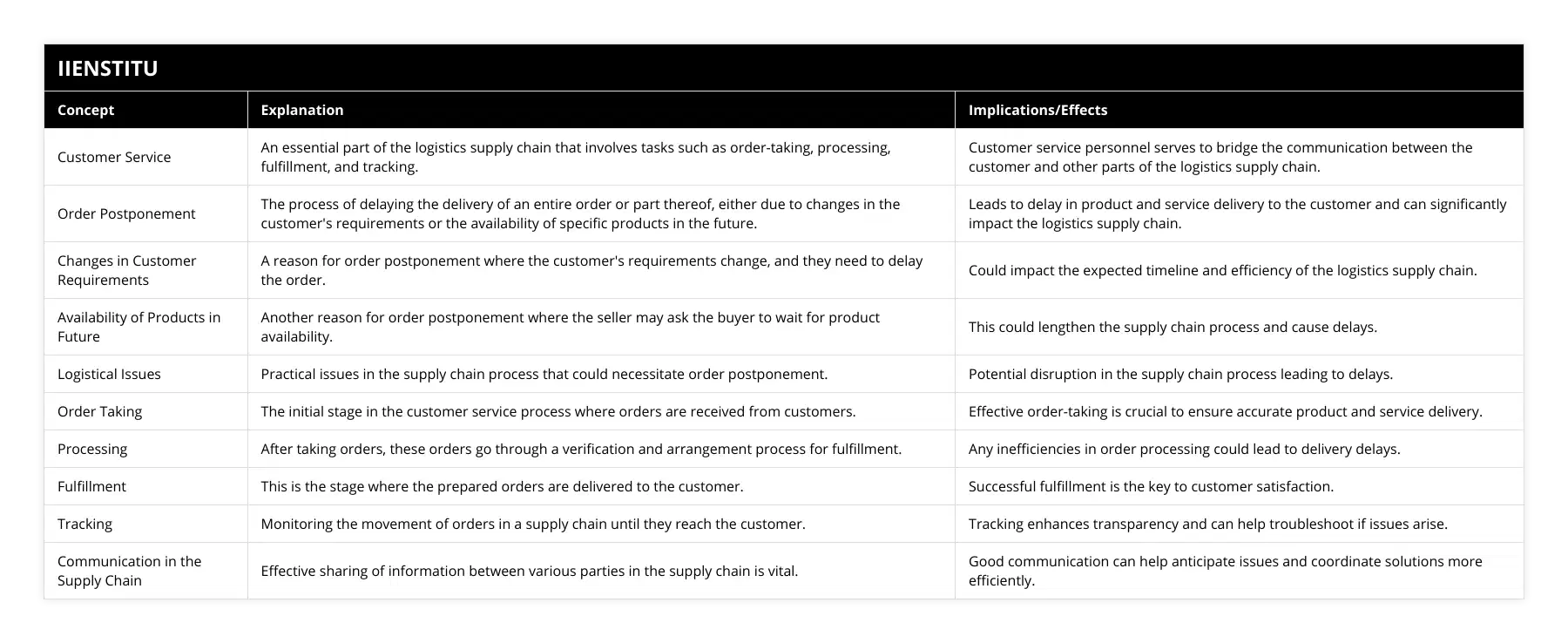
Frequently Asked Questions
What are the benefits of order postponement in logistics management?
Order postponement has become increasingly crucial to logistics management, as it presents a range of benefits for organizations. This article examines the advantages of order postponement and how organizations can make the most of this approach.
Order postponement involves delaying the completion of an order until the last possible moment and is often used by organizations to reduce inventory costs and improve customer satisfaction. This approach allows businesses to respond to customer demand promptly while reducing the inventory they need to keep on hand. As a result, organizations can make the most of their storage and transportation resources, helping to reduce costs.
Another advantage of order postponement is the ability to respond quickly to changes in the market. By postponing the completion of orders, businesses can adjust their production and delivery processes to meet changing customer needs. This approach also allows companies to take advantage of fluctuations in the market, allowing them to adapt their production and delivery processes accordingly.
Order postponement also helps organizations to reduce their environmental impact. By delaying the completion of orders, businesses can reduce their carbon footprint by reducing their transportation requirements. This approach can also help reduce production's environmental impact, as companies can avoid producing more goods than necessary.
Finally, order postponement can also help to improve customer satisfaction. By postponing the completion of orders, businesses can ensure that their customers receive their orders promptly. This approach can also help to reduce customer complaints, as companies can respond more quickly to customer queries.
In conclusion, order postponement is an essential part of logistics management and presents a range of benefits for organizations. By postponing the completion of orders, businesses can reduce their inventory costs, respond quickly to changes in the market, reduce their environmental impact, and improve customer satisfaction. In addition, organizations that make the most of this approach can gain a competitive advantage in the market.
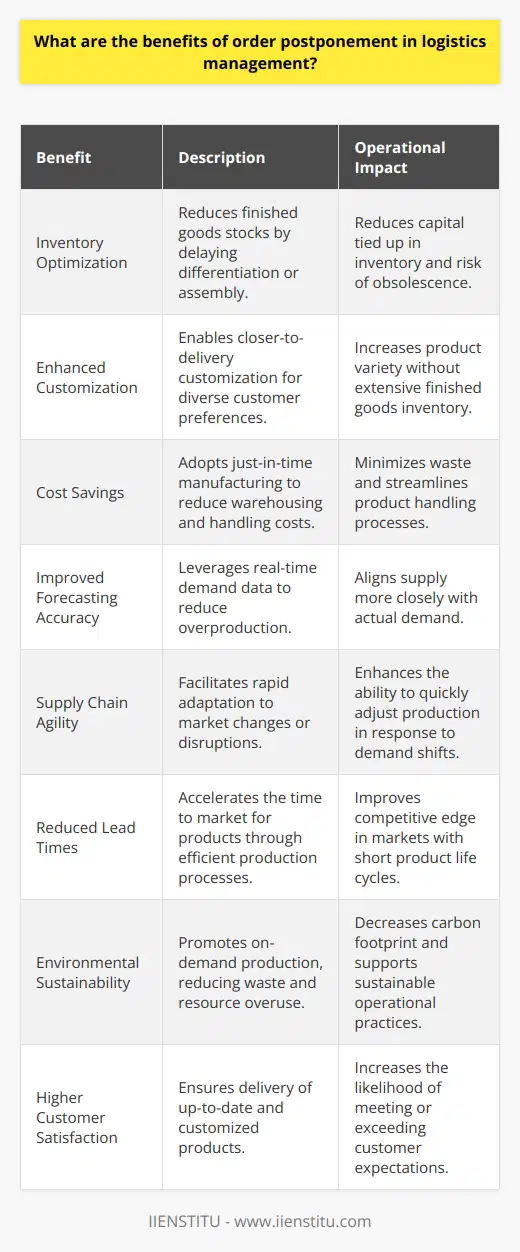
How can customer service be improved in the logistics supply chain?
Customer service is an essential aspect of logistics supply chain operations. As customers become more demanding and competitive, the need to provide superior customer service is more significant than ever. Improving customer service is critical to increasing customer satisfaction, loyalty, and profitability. There are several ways that companies can improve customer service in the logistics supply chain.
First, companies should implement a customer service strategy that considers their customers' unique needs. This includes developing a customer service plan that outlines the types of service that customers should expect, how customer service will be delivered, and how customer issues will be addressed. Additionally, companies should ensure that their customer service representatives are adequately trained and equipped to handle customer inquiries and problems.
Second, companies should focus on improving the efficiency and effectiveness of their logistics supply chain operations. This includes streamlining processes, utilizing automation, and leveraging technology to reduce costs and improve customer service. Additionally, companies should ensure that their supply chain is optimized to meet customer needs. This includes evaluating supplier performance, monitoring inventory levels, and ensuring that orders are delivered promptly.
Third, companies should strive to foster relationships with their customers. This includes providing customers personalized attention, responding quickly to customer inquiries and complaints, and offering incentives to encourage repeat business. Additionally, companies should strive to build customer trust and loyalty by providing quality products, services, and customer service.
Finally, companies should invest in customer service tools and technologies. This includes utilizing customer service software, implementing customer relationship management (CRM) systems, and utilizing analytics to gain insights into customer needs and preferences. Additionally, companies should leverage social media and other digital platforms to engage with customers and provide timely support.
By implementing these strategies, companies can improve customer service in the logistics supply chain, increase customer satisfaction, and, ultimately, increase profitability. In addition, by investing in customer service and leveraging technology, companies can ensure that their logistics supply chain operates efficiently and effectively and that their customers receive the best possible service.
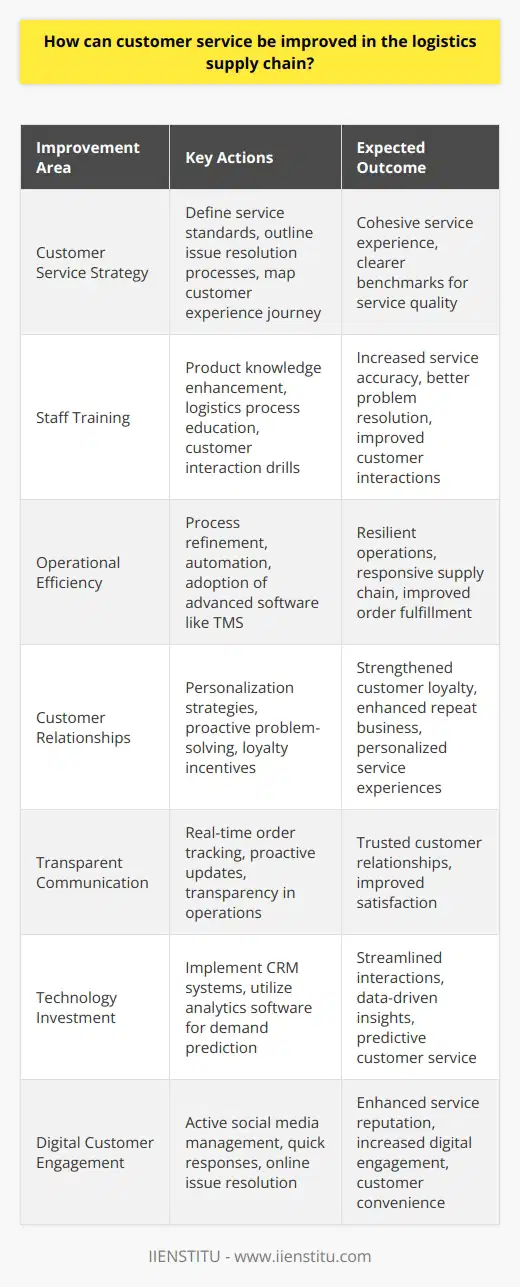
What are the most common reasons for order postponement in logistics management?
Order postponement is essential for logistics managers, as it can lead to delays in delivering goods and services. In this article, we will look at the most common reasons for order postponement in logistics management.
The first cause of order postponement is inadequate inventory management. Poor inventory management can lead to shortages of goods or services, resulting in delays in the delivery of orders. In addition, if the wrong items are ordered or placed late, this can lead to order postponement.
A second cause of order postponement is a lack of communication between suppliers and customers. If customers do not provide accurate and timely information to suppliers, or if suppliers do not provide the necessary information to customers, this can lead to delays in the delivery of orders.
A third cause of order postponement is poor forecasting. Poor forecasting can lead to incorrect demand calculations, resulting in insufficient or over-supply of goods or services. This can, in turn, lead to delays in the delivery of orders.
A fourth cause of order postponement is the failure to use modern technology. Many companies are now relying on technology to improve their logistics processes, such as automated warehouse management systems and real-time tracking of goods. If companies do not take advantage of these technological advances, this can lead to delays in the delivery of orders.
Finally, a fifth cause of order postponement is inadequate customer service. Poor customer service can lead to delays in the delivery of orders, as customers may not be aware of the status of their orders or may not be able to contact the supplier promptly.
In conclusion, the most common reasons for order postponement in logistics management are inadequate inventory management, lack of communication between customers and suppliers, poor forecasting, failure to use modern technology, and poor customer service. Therefore, logistics managers should be aware of these common causes of order postponement and take steps to ensure that orders are delivered on time.
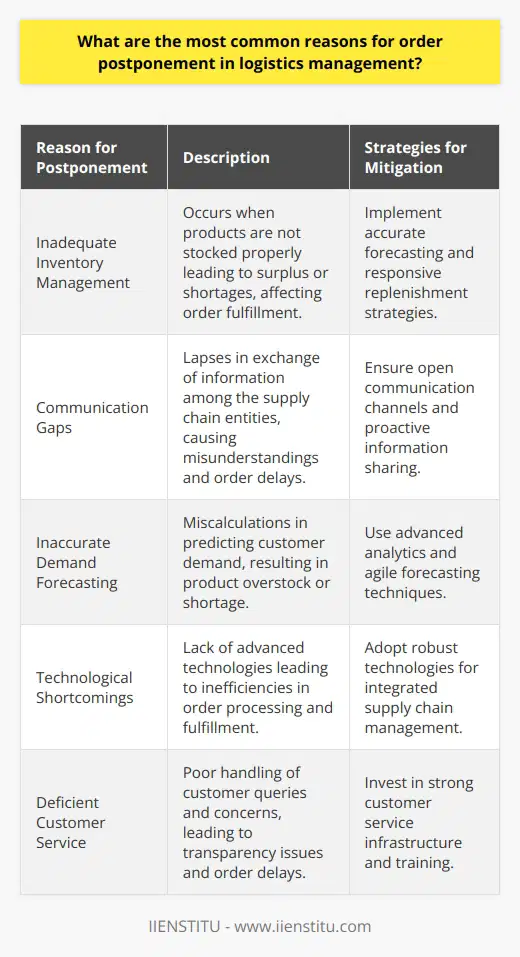
What is the role of postponement strategies in enhancing supply chain flexibility?
Role of Postponement Strategies in Supply Chain Flexibility
Understanding Postponement Strategies
Postponement strategies refer to the concept of delaying certain processes or decisions in the supply chain until the actual consumer demand is realized. By doing so, these strategies help companies improve their responsiveness and adaptability to changes in the market, ultimately enhancing supply chain flexibility.
Types of Postponement Strategies
There are two main types of postponement strategies: form postponement and time postponement. Form postponement involves delaying the finalization of a product's features, while time postponement refers to delaying actual production or distribution activities. Both types of postponement aim to improve supply chain flexibility by helping firms respond to customer preferences and demand more effectively.
Benefits of Implementing Postponement Strategies
The implementation of postponement strategies offers several benefits in enhancing supply chain flexibility, such as:
Reducing inventory risk: Postponement strategies allow companies to produce and maintain only generic products or components in inventory. This reduces the risk associated with holding excessive or obsolete inventory, as customized products are made only when required.
Facilitating customization: By delaying product differentiation, companies can better address customer preferences and tailor their offerings to suit individual requirements. This boosts customer satisfaction while increasing product competitiveness.
Enhancing responsiveness and adaptability: Postponement strategies enable companies to react promptly to changes in consumer demand and preferences. This allows for the quick adaptation of supply chains to respond to fluctuating market demands, ultimately increasing supply chain flexibility.
Challenges in Implementing Postponement Strategies
Despite their numerous benefits, implementing postponement strategies does have its challenges. These include:
Cost implications: Integrating postponement strategies into supply chains may incur additional costs, such as investing in flexible manufacturing equipment or redesigning production processes to cater to product variations.
Information processing: To effectively utilize postponement strategies, companies must collect and analyze real-time consumer demand information. This often requires advanced information technology infrastructure and processing capabilities.
Organizational change: Adopting postponement strategies may necessitate significant changes within the organization, including supply chain management, production processes, and employee skillsets.
Conclusion
Postponement strategies play a crucial role in enhancing supply chain flexibility by allowing companies to better respond to changing consumer demands and preferences. Although the implementation of these strategies presents certain challenges, the benefits offered in terms of inventory risk reduction, customization, and overall supply chain flexibility make postponement strategies an invaluable tool for companies seeking to stay competitive in today's dynamic business environment.
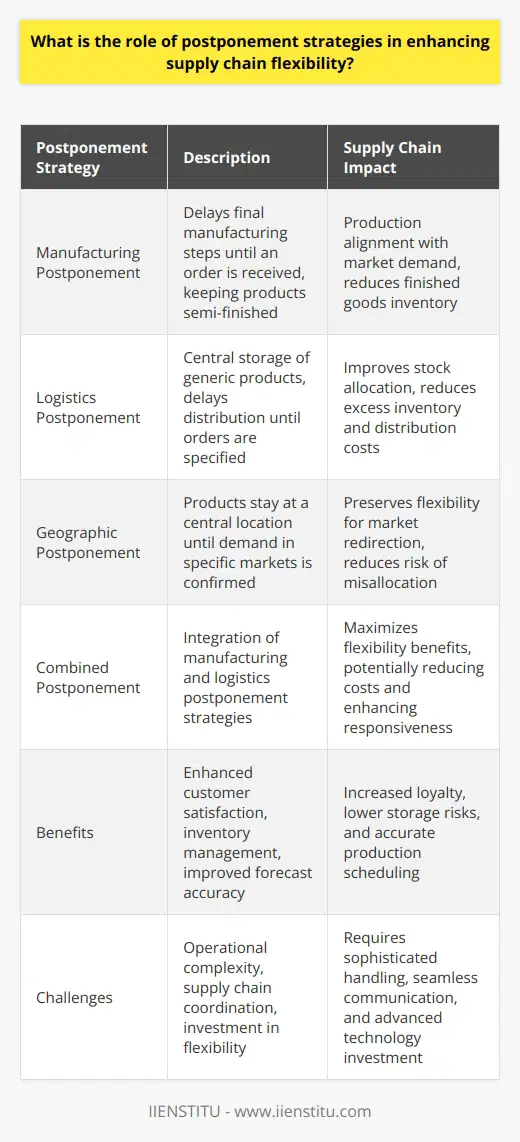
How do different types of postponement strategies impact inventory management in logistics?
Postponement Strategies and Inventory Management
Types of Postponement Strategies
Different types of postponement strategies have varying impacts on inventory management in logistics. Generally, postponement strategies refer to delaying certain activities in the supply chain until there is a clear demand for products. The three main types are time, form, and place postponement strategies.
Time Postponement
Time postponement involves delaying the movement of goods until a customer order has been received. This helps companies to avoid keeping excessive inventory, thereby reducing holding costs. Time postponement can significantly improve inventory management by helping firms to balance supply with demand, preventing situations of overstock or stock-outs.
Form Postponement
Form postponement pertains to delaying product customization or assembly until there is a customer order. Companies that use form postponement keep products in a semi-finished state, completing the final details based on specific customer requirements. This strategy reduces the need to maintain a large variety of finished products, leading to improved inventory control and reduced obsolescence costs. Additionally, form postponement contributes to enhanced customer satisfaction by offering tailored products.
Place Postponement
Place postponement pertains to delaying the allocation of products to specific locations or distribution channels until there is a clear demand. This strategy can help companies better manage inventory by assessing market demand and distributing products accordingly, resulting in optimal inventory allocation across locations. Place postponement strategy also contributes to the reduction of transportation costs, as goods can be shipped in larger quantities to meet customer demands.
Conclusion
Overall, the various types of postponement strategies profoundly impact inventory management in logistics by reducing holding costs, improving inventory control, enhancing customer satisfaction, and optimizing resource allocation. By implementing the appropriate postponement strategy, companies can achieve a more efficient and cost-effective supply chain, ultimately contributing to the overall success of the organization.
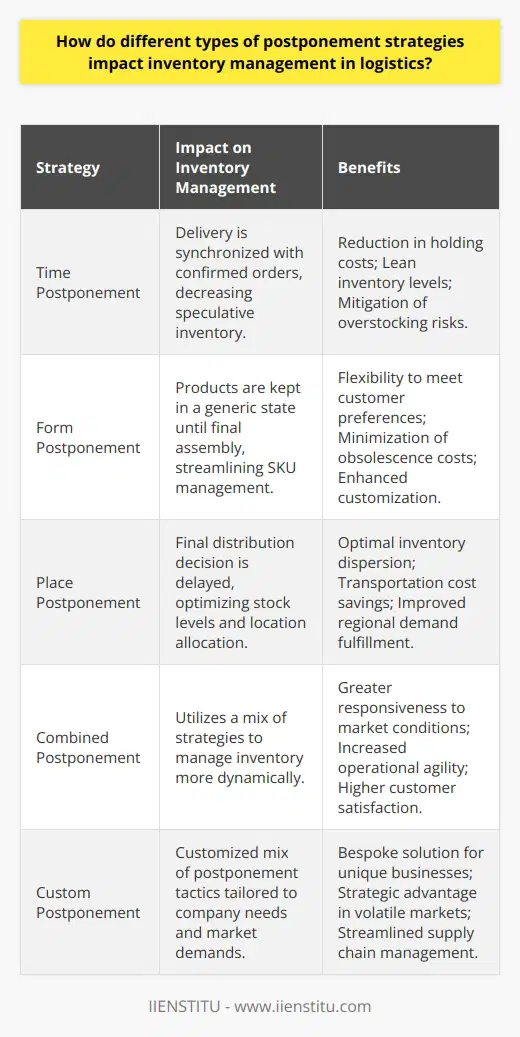
What are the key factors to consider when implementing postponement strategies in logistics operations?
Key Factors for Postponement Strategies
In the realm of logistics operations, implementing postponement strategies requires considering various key factors to ensure the efficient and effective functioning of the supply chain. The first factor is the type of postponement being implemented, whether it is manufacturing, logistics, or time-based. The choice should align with the organization's operational objectives and efficiency requirements.
Appropriate Technologies and Processes
The integration of appropriate technologies and processes plays a significant role in the effectiveness of postponement strategies. Innovations such as digitalization and automation can streamline operations, improve flexibility, and allow for better inventory control, ultimately leading to more effective postponement implementation.
Supply Chain Collaboration
Collaboration with supply chain partners is essential for synchronization and effective implementation of postponement strategies. Establishing strong relationships with suppliers, manufacturers, and distribution centers helps ensure accurate information sharing, increased visibility, and better coordination in executing postponement decisions.
Demand Forecasting Accuracy
Accurate demand forecasting is crucial in determining the success of postponement strategies. By closely monitoring market trends, customer behavior, and competitors, organizations can make informed postponement decisions and avoid costly inventory imbalances, stockouts, or overstock situations.
Cost-benefit Analysis
Evaluating the cost-benefit of implementing postponement strategies is essential in determining whether the potential efficiency gains outweigh the associated costs. Organizations need to assess the financial and operational implications encompassing inventory carrying cost, total logistics cost, and impacts on customer satisfaction.
Organizational Adaptability
Implementing postponement strategies demands a certain level of adaptability within the company, requiring a shift in organizational mindset, culture, and values. Emphasizing flexibility and responsiveness across all levels of the organization is necessary to ensure a smooth transition to a postponement-based approach.
Performance Measurement and Continuous Improvement
Lastly, establishing performance measurement systems, key performance indicators (KPIs), and monitoring efforts can aid organizations in assessing the effectiveness of their postponement strategies. This data-driven approach fosters continuous improvement and optimization, maximizing the benefits of postponement implementation in logistics operations.
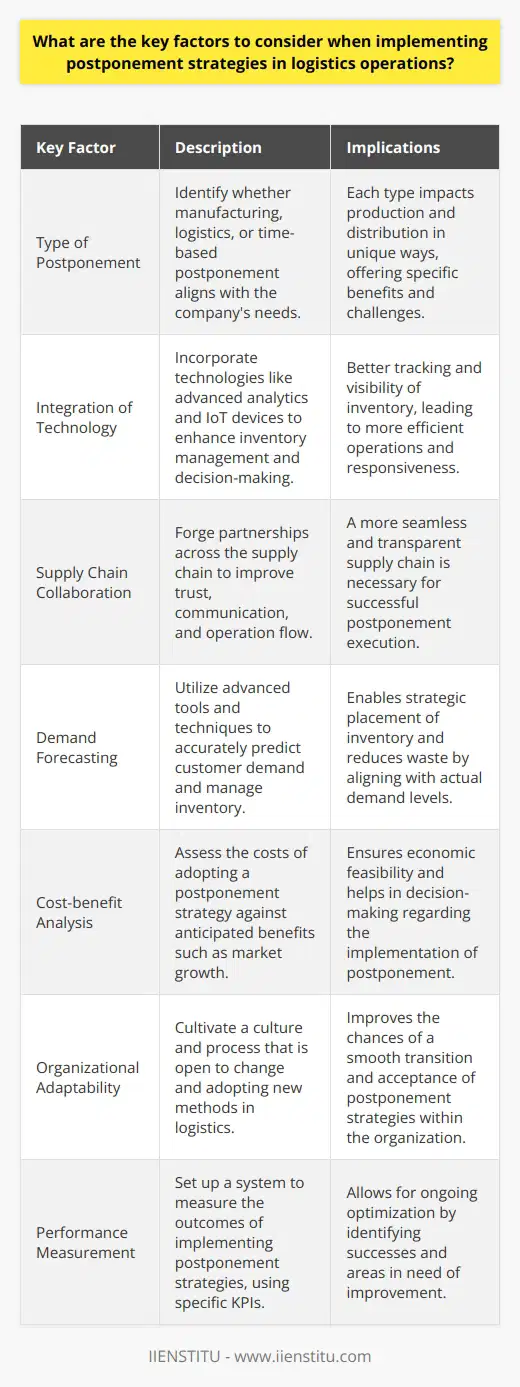
What is logistics postponement?
Definition of Logistics Postponement
Logistics postponement refers to the strategic approach of delaying specific logistical activities in the supply chain until customer demand is more accurately known. These activities may include transportation, distribution, and product configuration. The primary objective of logistics postponement is to minimize inventory carrying costs, reduce stock obsolescence, and optimize resources, thereby enhancing supply chain resilience and performance.
Advantages of Logistics Postponement
Implementing logistics postponement strategies provides several benefits to organizations. For instance, it allows businesses to make better-informed decisions regarding product customization and transportation modes. This leads to reduced lead times and increased responsiveness to dynamic customer demands, which ultimately results in higher customer satisfaction levels. Furthermore, the decreased likelihood of stock obsolescence due to improved visibility of market trends enables companies to save on costs associated with holding excessive inventory.
Examples of Postponement Practices
Postponement can take several forms within the supply chain, including but not limited to, manufacturing postponement, product postponement, and labeling postponement. Manufacturing postponement involves delaying the final assembly or production stages of a product until customer orders are received, ensuring optimal resource allocation and reducing the risk of producing obsolete items. Product postponement, on the other hand, refers to delaying the shipment of finished products until actual demand is known, thus reducing transportation costs and improving inventory management. Lastly, in labeling postponement, standard products are manufactured and their branding, packaging, and labeling activities are delayed until the target market-specific requirements are confirmed.
Role of Technology in Logistics Postponement
Technology plays a significant role in the successful implementation of logistics postponement strategies. Advanced forecasting tools, real-time data analytics, and inventory management systems are critical in enabling organizations to monitor market trends accurately, respond to shifts in demand, and make timely decisions concerning production and transportation activities. Moreover, the advent of automation, robotics, and artificial intelligence further streamlines supply chain operations, fostering a seamless flow of information and enhancing the overall efficiency of postponement practices.
Conclusion
In conclusion, logistics postponement serves as an effective approach to supply chain management, enabling organizations to minimize costs, mitigate risks, and enhance customer satisfaction. By delaying specific logistical activities until precise demand information is available, companies can respond more effectively to market dynamics, preventing stock obsolescence and improving resource allocation. The adoption of advanced technologies facilitates better implementation of postponement strategies, ensuring a resilient and agile supply chain.
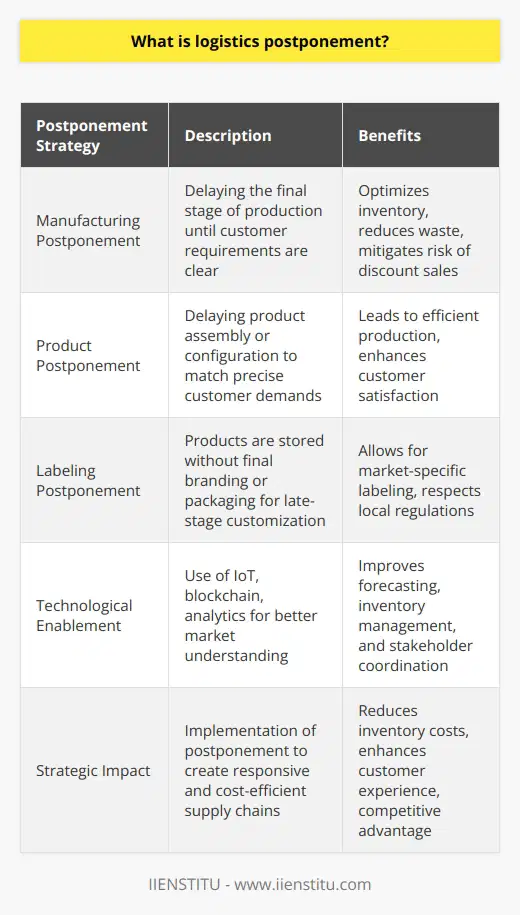
What is an example of logistic postponement?
Logistic Postponement: An Illustration
Definition and Concept
Logistic postponement refers to a strategic decision in supply chain management to delay specific activities, such as customization or final product assembly, until the final order is received. The purpose is to maintain a flexible and responsive supply chain, reducing inventory costs and obsolescence risks.
Example: Dell Computers
The classic example of logistic postponement is Dell Computers, which adopted the build-to-order model in the 1990s. Instead of producing and stocking a large inventory of finished products, Dell implemented a streamlined production approach that emphasized agility and customer input.
Delaying Product Assembly
Dell's approach involved manufacturing and storing generic components, postponing the final assembly of computers until customers placed orders with specific preferences in terms of memory, processor speed, and other features. This way, Dell could assemble customized products for each client, without holding a vast inventory of finished goods.
Reduced Inventory Costs and Obsolescence Risks
By implementing logistic postponement, Dell significantly reduced its inventory costs, as it no longer needed to maintain large stocks of finished products subject to depreciation and obsolescence. Moreover, this approach ensured that customers received the latest technology and specifications, enhancing customer satisfaction and loyalty.
Enhanced Responsiveness to Market Changes
The build-to-order model allowed Dell to respond swiftly to market changes, technological advancements, and customer preferences. As a result, the company could adapt its product offerings as per demand patterns, improving its supply chain efficiency and competitiveness in the rapidly evolving computer industry.
In summary, logistic postponement, as exemplified by Dell Computers' build-to-order model, offers numerous benefits to businesses, including reduced inventory costs, minimized risks of obsolescence, and enhanced responsiveness to market dynamics. Therefore, it remains a valuable strategy in supply chain management for companies operating in fast-paced and competitive industries.
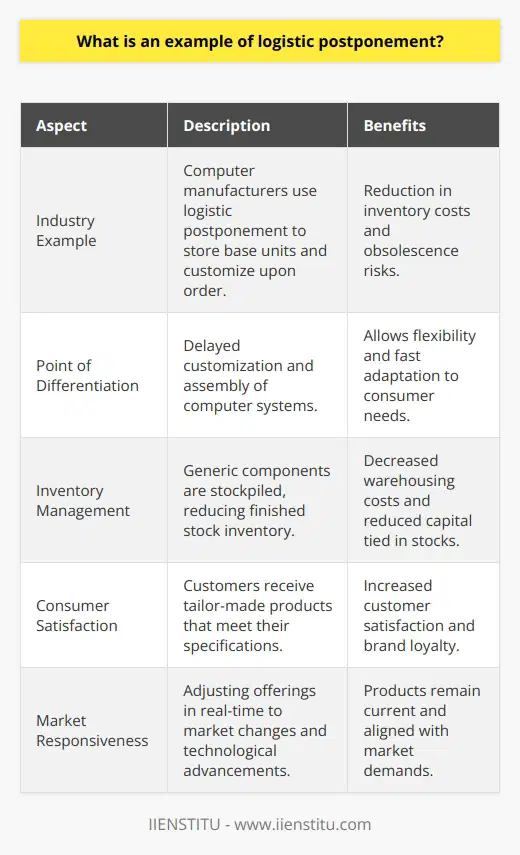
What is postponement in supply chain management?
Postponement in Supply Chain Management
Concept and Implementation
Postponement, as a concept in supply chain management (SCM), refers to the strategic delay of final product assembly, distribution, or configuration until customer demand is explicitly known. It is a key mechanism that enables companies to minimize inventory costs, reduce lead times, and enhance their adaptive capacity. Postponement replaces a traditional make-to-stock approach, characterized by constant production of finished goods, with a make-to-order model that emphasizes demand-driven manufacturing and logistics processes.
Benefits of Postponement
Implementing postponement strategies can significantly improve a company's competitive advantage. Firstly, it enables better demand forecasting and inventory management. By delaying production or distribution until a precise customer requirement is identified, manufacturers and retailers can allocate resources more efficiently, mitigating the risks of overstocking or stockouts. Additionally, it enhances product customization, compatibility, and flexibility. Postponement allows companies to offer a broader range of product variations or options at a lower cost and shorter lead time, meeting diverse customer needs more effectively.
Forms of Postponement
There are two primary forms of postponement: manufacturing and logistics postponement. Manufacturing postponement refers to the delay of final assembly or production operations. An example of this is Dell's built-to-order computer manufacturing model, where products are only assembled and customized after a customer places an order. On the other hand, logistics postponement involves the alteration of product configuration or packaging at distribution centers, closer to the end customer. This approach can be found in consumer goods companies, where products are packaged, labeled, or modified according to regional or local market preferences.
Challenges to Postponement Implementation
Despite its numerous advantages, postponement is not without its challenges. One significant obstacle lies in the infrastructural overhaul and operational changes required for adoption. Companies may face resistance to change, process reengineering costs, and prolonged implementation times. Another challenge relates to the trade-off between economies of scale and scope. Whilst postponement improves product customization and reduces inventory costs, it may compromise low-cost, high-volume production capabilities. Thus, companies must strike a balance between the benefits of postponement and the potential impact on operational efficiency.
Conclusion
In conclusion, postponement encompasses essential strategies for modern supply chain management, enhancing the management of inventory, demand forecasting, and product customization. By implementing manufacturing or logistics postponement, companies can optimize their resources and adapt more effectively to fluctuations in customer demand. Nonetheless, challenges related to change resistance and efficiency trade-offs must be considered and navigated carefully by organizations aiming for successful postponement implementation.
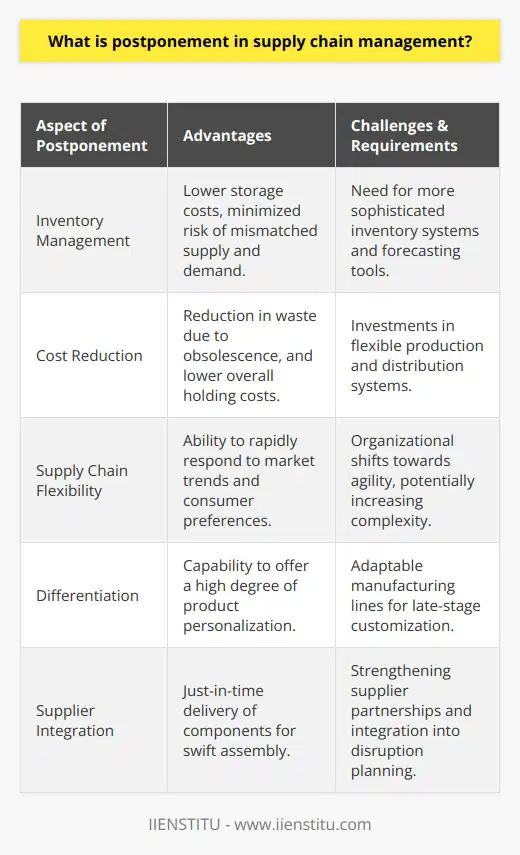
What is the role of logistics in customer service?
Role of Logistics in Enhancing Customer Satisfaction
Logistics Management and Customer Service
Logistics plays a critical role in customer service by ensuring the timely and efficient delivery of products and services. Effective logistics management helps organizations meet customer expectations, and it can significantly influence customer satisfaction levels. Logistics management involves coordinating, managing, and controlling the flow of goods and services from the point of origin to the end consumer.
Order Processing and Fulfillment
One vital aspect of logistics in customer service is order processing and fulfillment, which entails receiving orders, picking, packing, and dispatching the products to customers. Efficient order processing and fulfillment lower the lead time, which refers to the time lapse between order placement and delivery. Reducing lead times helps companies meet their clients' expectations, thereby enhancing customer satisfaction.
Inventory Management
Effective inventory management is essential in logistics, as it ensures that organizations have the right products in stock to meet customer demands. Inventory management combines the processes of forecasting demand, deciding optimal stock levels, and replenishing goods when required. Appropriate inventory management minimizes stockouts (unavailability of products), effectively avoiding delays in order fulfillment and helping businesses maintain customer satisfaction.
Transportation and Distribution
The transportation and distribution of goods is a critical element of logistics in customer service, with efficient transportation systems contributing to product availability and timely deliveries. Selecting suitable transportation modes, designing optimal routes, and managing carriers contribute to the effectiveness of distribution networks. An efficient distribution system minimizes delays in delivering products to customers, enhancing their overall experience and satisfaction.
Quality and Compliance
Logistics also plays a role in customer service by ensuring the quality and compliance of products and services delivered to customers. It involves monitoring storage conditions, handling methods, and safety measures to maintain the quality of goods throughout the supply chain. Compliance with industry regulations and standards is vital in logistics to avoid penalties, maintain brand reputation, and provide reliable services to customers.
In conclusion, logistics is a vital component of customer service, with its many functions playing a significant role in satisfying customers' expectations. Efficient logistics management, including order processing, inventory management, transportation, and quality control, contributes to meeting customer demands and fostering positive customer experiences, ultimately leading to long-lasting customer relationships and business success.
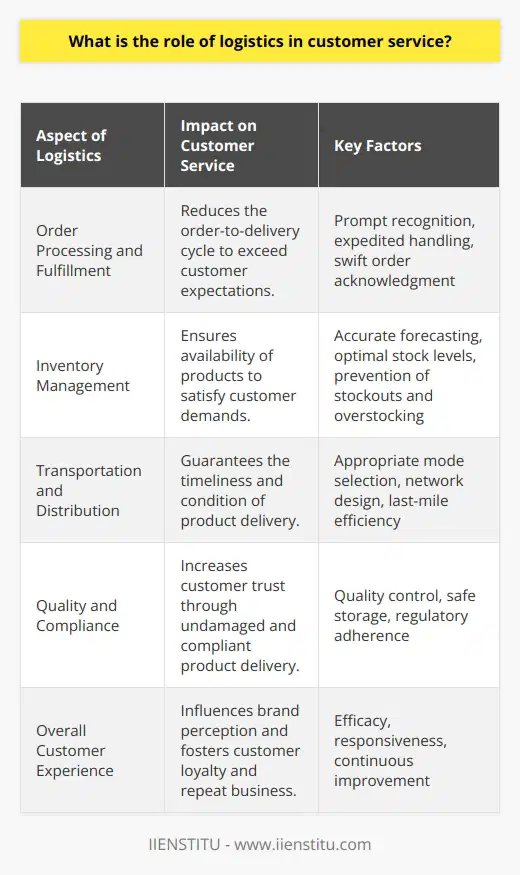
How does logistics postponement affect overall supply chain performance?
Impact on Supply Chain Efficiency
Logistics postponement involves delaying specific activities in the supply chain until more accurate demand information is available. This approach affects overall supply chain performance by reducing uncertainties, minimizing inventory costs, and improving customer satisfaction.
Reducing Uncertainties
Postponing logistics activities until demand is more predictable allows supply chain managers to make better-informed decisions. As a result, companies can avoid stockouts and overstocks, leading to increased supply chain efficiency. By reacting swiftly to real-time market information, firms can better align their production and distribution processes to meet customer needs.
Minimizing Inventory Costs
Logistics postponement allows companies to reduce their inventory carrying costs significantly. By aggregating goods at a central location, firms can lower safety stock requirements and the risk of obsolescence. Moreover, companies can respond to sudden changes in demand conditions more effectively, preventing the need to hold large quantities of finished goods. Thus, postponement strategies enable organizations to optimize their inventory management, contributing to lower overall supply chain costs.
Improving Customer Satisfaction
Through logistics postponement, companies can tailor their offerings to specific customer segments, geographical regions, and demand conditions. By customizing products late in the supply chain process, firms can adapt to changing consumer preferences more easily. Furthermore, postponement enables organizations to shorten order-to-delivery cycles, enhancing customer satisfaction and generating positive brand experiences.
In conclusion, logistics postponement positively impacts supply chain performance by mitigating uncertainties, lowering inventory costs, and fostering better customer relationships. By incorporating postponement strategies into their supply chain operations, companies can improve their overall efficiency and competitiveness in a dynamic market environment.
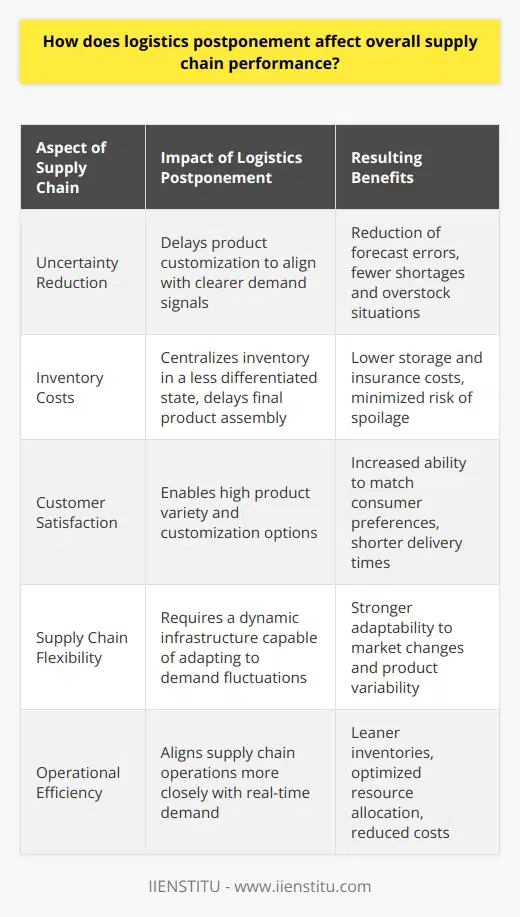
How can postponement strategies be applied to mitigate supply chain risks?
**Understanding Supply Chain Risks**
The first step in mitigating supply chain risks is understanding the potential risks and their impact on the organization. Supply chain risks come in various forms, including operational, financial, and environmental risks. Identifying these risks allows businesses to outline appropriate postponement strategies to address them.
**Applying Postponement Strategies**
Postponement strategies are the practice of delaying specific stages of the manufacturing or distribution process until the actual demand for a product is known. By applying these strategies, businesses can reduce the impact of supply chain risks through the following approaches:
**Risk Avoidance**: By understanding potential risks, businesses can create a more stable supply chain by avoiding high-risk suppliers or locations. This may involve diversifying sourcing locations, monitoring partner performance, or choosing alternative raw materials.
**Risk Reduction**: Postponing decisions or activities, such as manufacturing or sourcing, until there is more certainty about demand, can reduce the risk of excess inventory or potential production delays. This can be achieved by implementing techniques such as delayed differentiation or modular assembly.
**Risk Sharing**: Collaborating with supply chain partners can enable better information-sharing and risk mitigation. For instance, sharing forecasts, sales data, or inventory information with suppliers and distributors can improve decision-making and reduce the potential impact of supply chain disruptions.
**Risk Monitoring**: Implementing supply chain visibility tools can provide real-time information on potential risks, enabling businesses to react more quickly to disruptions. Advanced technologies, such as the Internet of Things (IoT) and cloud-based solutions, can help organizations monitor risks across their supply chain continuously.
**Benefits of Postponement Strategies**
Applying postponement strategies can contribute to mitigating supply chain risks in several ways. Including reduced inventory levels, lower warehousing costs, and more accurate forecasting. Additionally, a more flexible and adaptable supply chain can better handle unexpected events, such as demand fluctuations or supply disruptions, ultimately resulting in increased customer satisfaction and improved profitability.
**Conclusion**
Overall, postponement strategies allow businesses to respond more effectively to supply chain risks by avoiding or reducing risks, sharing responsibilities with partners, and continuously monitoring their network for potential disruptions. By implementing these strategies, organizations can increase their supply chain resiliency and better manage the uncertainties associated with global supply chains.
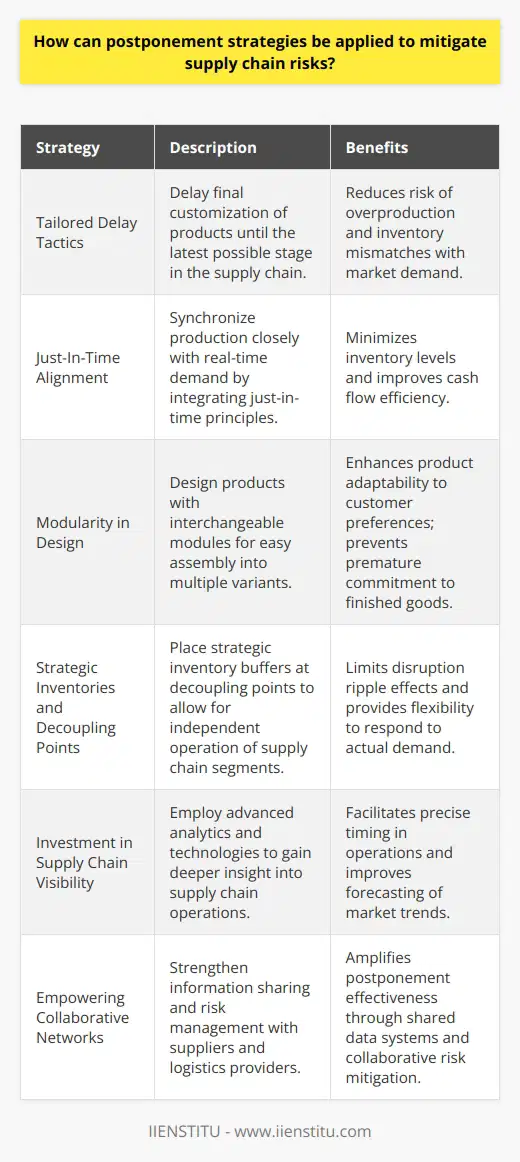
What is the role of logistics management in customer service?
Role of Logistics Management in Customer Service
Enhancing Customer Satisfaction
The role of logistics management in customer service is crucial as it directly impacts customer satisfaction. Effective logistics management ensures the timely delivery of products to customers, resulting in a positive customer experience and fostering customer loyalty. It involves the efficient planning and execution of transportation, warehousing, and inventory management to meet customer expectations.
Reducing Costs for Customers
By optimizing supply chain processes, logistics management plays a significant role in reducing costs for customers. Efficient logistics management minimizes redundant activities and excessive inventory levels, which ultimately leads to cost savings. These cost savings can be passed on to customers, offering them with competitive prices and improving their overall experience with the company.
Adapting to Customer Needs
Logistics management also enables companies to be more flexible and responsive to customer needs. By utilizing advanced technologies such as artificial intelligence and machine learning, logistics management can anticipate customer demands, enabling businesses to adjust their supply chains accordingly. This proactive approach ensures that companies consistently provide high-quality services and products to their customers, meeting their ever-changing needs and preferences.
Customizing Delivery Services
Another aspect of logistics management's role in customer service is its ability to offer customized delivery services, catering to the unique needs and requirements of each customer. By leveraging data analytics and real-time tracking, logistics management can provide customers with personalized delivery options such as expedited shipping, precise tracking information, and flexible delivery windows. This customization of service creates a seamless and convenient experience for customers, strengthening the relationship between them and the company.
Ensuring Effective Communication
Lastly, logistics management plays an essential role in maintaining effective communication with customers throughout the entire purchasing process. By utilizing digital tools and systems, logistics management can provide customers with real-time updates on order status, shipping details, and estimated arrival times. This transparent communication not only keeps customers informed, but also helps to manage their expectations and mitigate any potential dissatisfaction arising from delays or unforeseen challenges.
In conclusion, logistics management serves an indispensable function in customer service by enhancing customer satisfaction, reducing costs, adapting to customer needs, customizing delivery services, and ensuring effective communication. By managing and optimizing these interconnected aspects, companies can create a positive and memorable customer experience, leading to lasting brand loyalty and long-term business success.
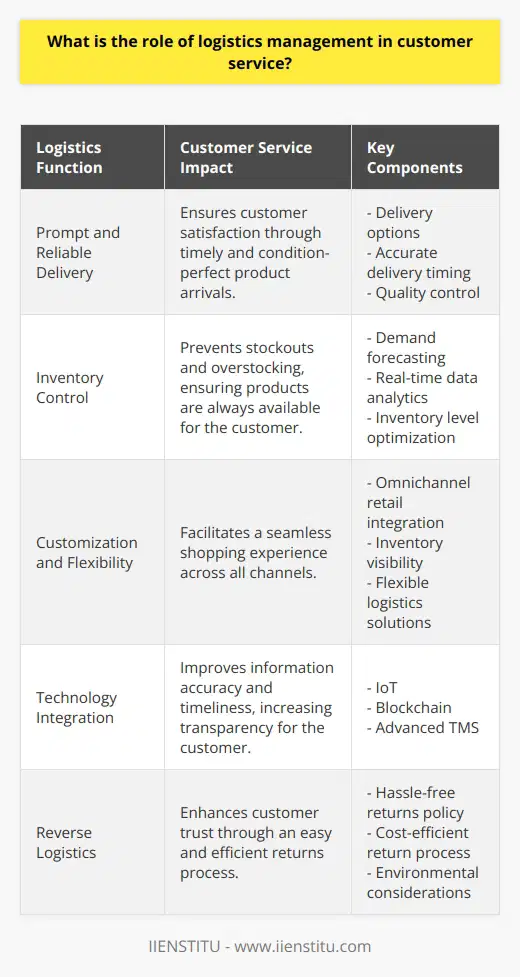
How does logistic postponement help companies improve their supply chain efficiency?
Logistic Postponement: An Overview
Logistic postponement is a supply chain strategy that involves delaying certain logistical activities until customer demand is known. This approach helps companies improve their supply chain efficiency by reducing inventory carrying costs, minimizing stockouts, and better matching supply with demand.
Inventory Reduction and Carrying Costs
A key benefit of logistic postponement is the reduction in inventory levels. By waiting until demand is clear, companies can avoid overstocking products that may not sell, thus reducing inventory costs. Additionally, carrying excess inventory comes with significant costs, such as warehousing, transportation, and insurance. Postponing logistics allows organizations to minimize these expenses and enhance overall supply chain performance.
Minimizing Stockouts and Improved Customer Satisfaction
Another advantage of logistic postponement is the reduction in stockouts - instances when a product is unavailable for purchase. By delaying logistics activities, companies can better match supply to demand, reducing the likelihood of running out of stock. By minimizing stockouts, companies can increase customer satisfaction and loyalty, vital factors in a competitive business environment.
Supply and Demand Alignment
Logistic postponement enables companies to adapt their supply chains to shifts in demand patterns. By not committing to specific products or markets until orders are received, businesses can effectively respond to changes in customer preferences, emerging trends, and fluctuating market conditions. This flexibility leads to improved supply chain efficiency, as resources are allocated to the most profitable and promising opportunities.
In conclusion, logistic postponement is an essential tool for companies aiming to improve their supply chain efficiency. By reducing inventory carrying costs, minimizing stockouts, and better aligning supply with demand, this strategy allows organizations to enhance their overall performance and succeed in an increasingly competitive market.
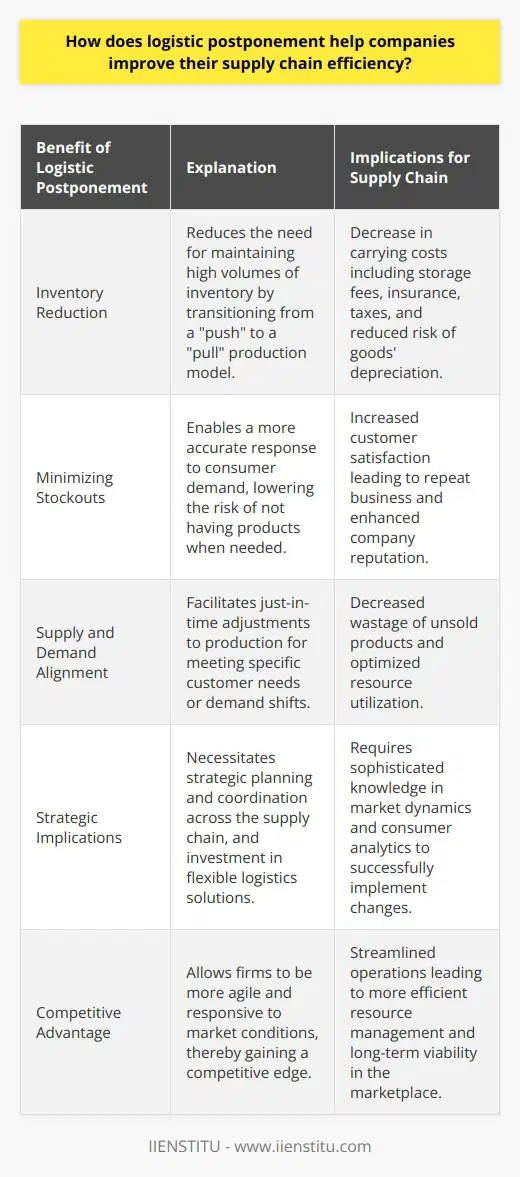
What are some challenges and potential drawbacks of implementing postponement strategies in supply chain management?
Challenges of Postponement Strategies
While postponement strategies offer potential benefits in supply chain management, they come with several challenges and drawbacks. First, implementing postponement requires substantial investment in infrastructure, systems, and personnel training. Companies need to develop and maintain flexible facilities and processes capable of responding swiftly to changes in market demand. Furthermore, firms must establish strong relationships with suppliers and customers to ensure the accuracy of demand forecasting and the timely exchange of information.
Increased Complexity of Operations
Postponement strategies add complexity to both manufacturing and logistics operations. Companies must reengineer their production systems to accommodate the delayed product differentiation, which can lead to challenges related to increased inventory management, capacity planning, and scheduling adjustments. The late-stage customization may cause an increase in process variability, which can hurt efficiency and operational performance due to the need for constant adjustments and reallocations of resources.
Reduced Economies of Scale
The implementation of postponement can negatively affect economies of scale. Manufacturing large quantities of standardized products usually leads to lower costs due to specialized labor and higher machine utilization. Delaying the customization process results in smaller production runs of differentiated products, which can increase per-unit costs and diminish the advantages of large-scale manufacturing.
Risk of Customer Dissatisfaction
Another potential drawback of implementing postponement strategies is the risk of customer dissatisfaction. The increased reliance on accurate demand forecasting can leave companies vulnerable to misinterpreting market signals or experiencing unforeseen shifts in customer preferences. Inaccurate forecasts can result in stockouts or excess inventory of specified products, leading to customer dissatisfaction and the potential loss of market share.
Longer Lead Times
Finally, postponement strategies might lead to longer lead times, creating a disadvantage in highly competitive markets. Delaying product customization until closer to the point of sale may require additional time for processing, potentially affecting the company's ability to fulfill orders in a timely manner. In industries where rapid delivery is crucial, this could hurt the company's competitive positioning.
In conclusion, while implementing postponement strategies in supply chain management can offer potential benefits, companies must weigh the challenges and drawbacks, such as increased complexity of operations, reduced economies of scale, risk of customer dissatisfaction, and longer lead times, before deciding if it is the right decision for their particular situation.
